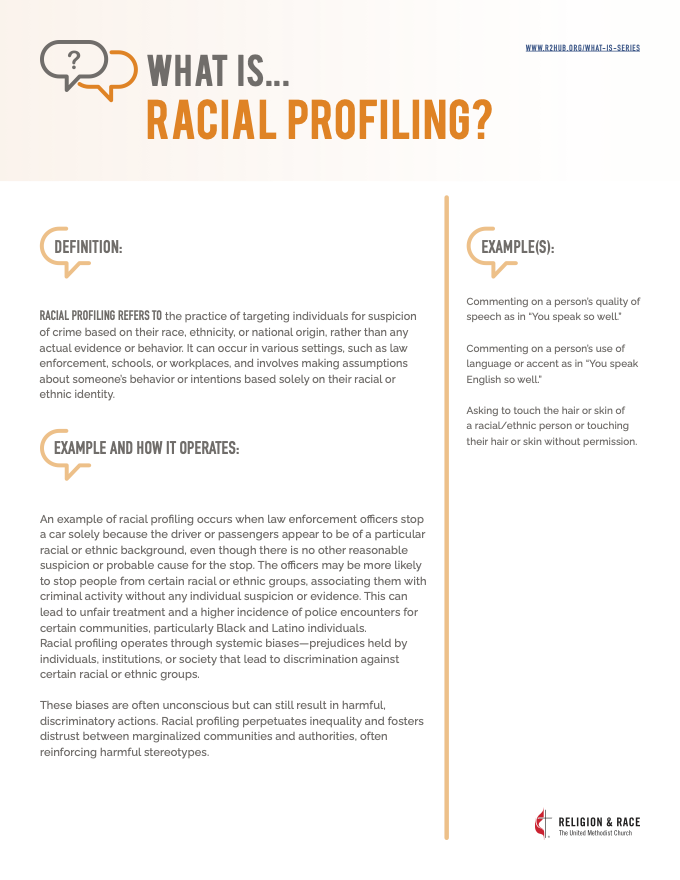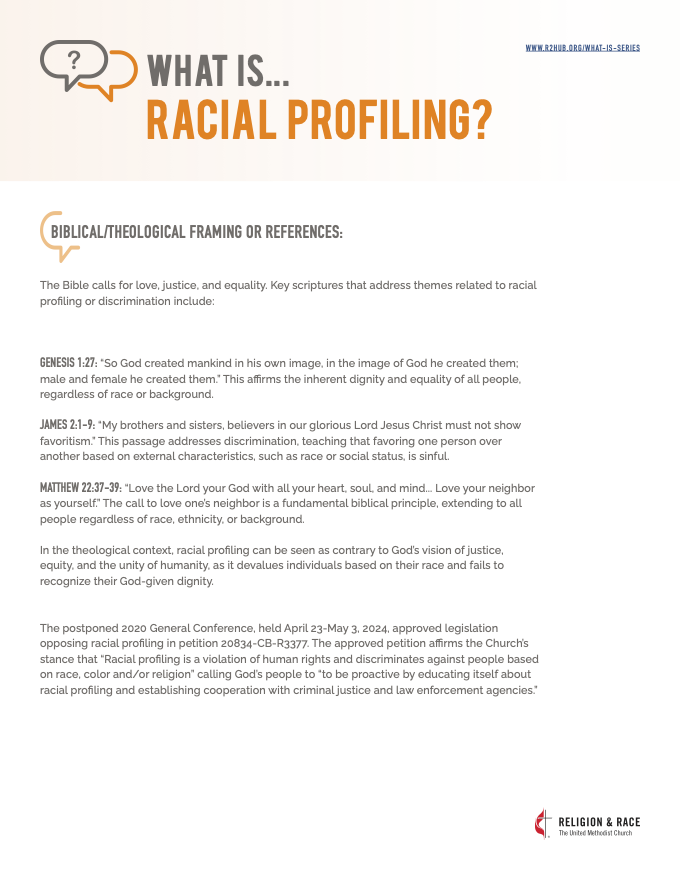What is Racial Profiling?


Download
The content below is available for download as a PDF.
About
As humanity’s understanding and discussion of the concepts of race, racism, and antiracism have evolved over generations, so have the words and phrases we use as we continue the work of obeying God and advancing racial justice.
In this “What Is?” series, the General Commission on Religion and Race offers this compilation of concise definitions, examples, and Biblical/theological foundations to create common vocabulary for Christians as we engage in anti-racism work.
Our hope, as you engage this series, is that the learning equips you to move into deeper waters in anti-racism work in your respective context.
Visit the series homepage for more information on other anti-racism resources.
Definition
RACIAL PROFILING refers to the practice of targeting individuals for suspicion of crime based on their race, ethnicity, or national origin, rather than any actual evidence or behavior. It can occur in various settings, such as law enforcement, schools, or workplaces, and involves making assumptions about someone’s behavior or intentions based solely on their racial or ethnic identity.
Example and How It Operates
An example of racial profiling occurs when law enforcement officers stop a car solely because the driver or passengers appear to be of a particular racial or ethnic background, even though there is no other reasonable suspicion or probable cause for the stop. The officers may be more likely to stop people from certain racial or ethnic groups, associating them with criminal activity without any individual suspicion or evidence. This can lead to unfair treatment and a higher incidence of police encounters for certain communities, particularly Black and Latino individuals.
Racial profiling operates through systemic biases—prejudices held by individuals, institutions, or society that lead to discrimination against certain racial or ethnic groups.
These biases are often unconscious but can still result in harmful, discriminatory actions. Racial profiling perpetuates inequality and fosters distrust between marginalized communities and authorities, often reinforcing harmful stereotypes.
Biblical / Theological Framing
The Bible calls for love, justice, and equality. Key scriptures that address themes related to racial profiling or discrimination include:
GENESIS 1:27: “So God created mankind in his own image, in the image of God he created them; male and female he created them.” This affirms the inherent dignity and equality of all people, regardless of race or background.
JAMES 2:1-9: “My brothers and sisters, believers in our glorious Lord Jesus Christ must not show favoritism.” This passage addresses discrimination, teaching that favoring one person over another based on external characteristics, such as race or social status, is sinful.
MATTHEW 22:37-39: “Love the Lord your God with all your heart, soul, and mind... Love your neighbor as yourself.” The call to love one’s neighbor is a fundamental biblical principle, extending to all people regardless of race, ethnicity, or background.
In the theological context, racial profiling can be seen as contrary to God’s vision of justice, equity, and the unity of humanity, as it devalues individuals based on their race and fails to recognize their God-given dignity.
The postponed 2020 General Conference, held April 23-May 3, 2024, approved legislation opposing racial profiling in petition 20834-CB-R3377. The approved petition affirms the Church’s stance that “Racial profiling is a violation of human rights and discriminates against people based on race, color and/or religion” calling God’s people to “to be proactive by educating itself about racial profiling and establishing cooperation with criminal justice and law enforcement agencies.”
Reflection Questions
Have you ever witnessed or experienced racial profiling? How did it make you feel, and how did it impact the community involved?
What steps can individuals, organizations, and governments take to reduce or eliminate racial profiling?
How can the biblical command to love our neighbors as ourselves shape our attitudes and actions toward racial justice?
Reflect on the last encounter you had with a person of a different experience or culture. How did your understanding and experience of history inform that encounter?
